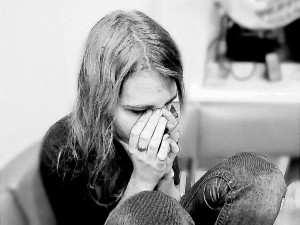- Calls to this hotline are currently being directed to Within Health or Eating Disorder Solutions
- Representatives are standing by 24/7 to help answer your questions
- All calls are confidential and HIPAA compliant
- There is no obligation or cost to call
- Eating Disorder Hope does not receive any commissions or fees dependent upon which provider you select
- Additional treatment providers are located on our directory or samhsa.gov
Poor Body Image and Depression
Contributor: Deanna James, LPC, R-DMT, from Castlewood Treatment Centers

Through an understanding and recognition of how they operate, it’s possible to change old ways of thinking and replace them with new solutions.
Understanding Negative Self-Talk
Understanding where negative self-talk begins can be an overwhelming endeavor. Many people have become so accustomed to the emphasis our culture places on appearance that obsessing about it seems normal. In addition to this, there are unlimited ways an individual’s self-esteem and the way they perceive their body can be influenced.
Sometimes inherited factors may predispose someone to certain issues, including the way a person is raised and to what degree parents or caregivers encourage a positive self-image. Personal experience (trauma can have a significant impact) and social environment, are also other factors to consider.
The Definition of Body Image

However, because there is a complex overlap between emotions and self-perception, body image is not always reflective of how an individual actually appears. Like self-esteem, body image can be distorted or inflated, relatively accurate or slightly ignored depending on the individual.
Depression and/or body image issues can begin in adolescence in response to the body changing and developing for the first time. There is a heightened attention and critical appraisal of the body, coupled with a greater vulnerability for emotional distress due to a flux of hormones and new feelings. This surge in emotion is coupled with the fact that females place a higher value in a body’s appearance, while males place a higher value in its effectiveness (Moitra).
How Men Are Vulnerable to Eating Disorders
This by no means indicates that men are not vulnerable to the cycles of negative body image and depression. In fact, it’s estimated that roughly 45% of men are unhappy with their bodies (Better Health). The same factors and pressures exist for men, but the ways in which the disorders will express themselves can be different.
Men, for example, can be more likely to engage in over-exercising, generally being pushed toward the use and effectiveness of their body being likened to a machine.
The Societal Connection of Attractiveness with Success

There is a correlation between poor body image and eating behaviors. When people feel poorly about themselves and have a negative body image, they are more likely to be susceptible to disordered eating behavior (Cargill, 2012). The negative self-talk and appraisal of one’s body and appearance, coupled with depression, can lead to a negative cycle of living.
How Body Image Is a Purely Personal Problem
While those suffering from depression tend to perceive themselves as less physically attractive, they retain the ability to be objective about the attractiveness of others. This means that those who struggle with depression and poor body image do not have a global distortion of body image (Moitra).
Through recognizing and acknowledging negative thought patterns and feelings, it’s possible to take a pro-active approach to depression and body image. Getting treatment for depression and/or distorted body image is a critical step to recovery. The problem, unfortunately, won’t go away just by hoping for change. It’s important to take steps toward effectively changing patterns, and cognitive behavior therapy has been shown to have fantastic results for individuals struggling with these issues.
How to Create Positive Body Image

The #NoFilter #CWRecovery #AllianceforED campaign is dedicated to celebrating authentic beauty and encouraging positive body image. Join the movement today to end the negative cycle of poor body image and depression.
Check out Castlewood Treatment Centers’ infographic on body image below.
Click to enlarge:
Community Discussion – Share your thoughts here!
Have your or your loved one struggled with poor body image and depression? What tools have you learned to encourage a positive body image within yourself? What advice do you have to share with others battling these issues?
References:
- Better Health Channel. Body image – men (n.d.) Web (05/10/15): http://www.betterhealth.vic.gov.au/Bhcv2/bhcarticles.nsf/pages/Body_image_issues_for_men?open
- Cargill, Byron R. Ph. D. Binge Eating, Body Image, Depression, and Self-Efficacy in an Obese Clinical Population. (9/6/12) Web (5/10/15): http://onlinelibrary.wiley.com/doi/10.1002/j.1550-8528.1999.tb00421.x/abstract
- Ekern, Jacquelyn MS, LPC. Weight & Body Image Disorders: Causes, Symptoms & Signs. (3/16/15) Web (05/10/15): https://www.eatingdisorderhope.com/information/body-image
- Moitra, Alika. Depression and Body Image (n.d.) Web: http://www.vanderbilt.edu/AnS/psychology/health_psychology/depressbi.html
- National Eating Disorders Association (NEDA). What is Body Image? (n.d.). Web (11/26/14) https://www.nationaleatingdisorders.org/what-body-image
The opinions and views of our guest contributors are shared to provide a broad perspective of eating disorders. These are not necessarily the views of Eating Disorder Hope, but an effort to offer discussion of various issues by different concerned individuals.
Last Updated & Reviewed By: Jacquelyn Ekern, MS, LPC on November 4th, 2015
Published on EatingDisorderHope.com

